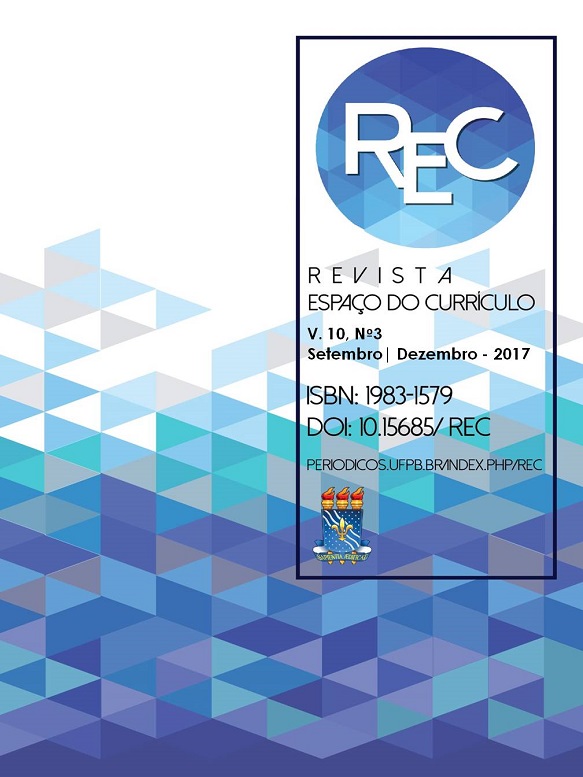CHALLENGES OF CURRICULAR INTEGRATION IN THE FACE OF VIOLENCE AND SCHOOL INDISCPLINE
DOI:
https://doi.org/10.15687/rec.v10i3.32189Keywords:
Curriculum., Schools., Integration., Indiscipline., Violence.Abstract
The present study addresses issues related to indiscipline and violence in schools and their relationship with the curriculum. Historically, educational andcurricular policies are based on discursive practices that affirm both integration and curricular disintegration movements in professional and technological education. In this sense, it is asked: how to unify a curriculum, if each region and school community are distinct with their specific peculiarities? In the context of this discussion, this bibliographic writing aims to contemplate the discussion on the relationship between violence and indiscipline with the current curricular structure in high schoolswith curriculum integrated approach. Much has been insisted on the permanent formation of teachers, however, it is observed that this has happened in a bureaucratic way in order to generate numerical certifications to the professionals involved, however, the themes debated in these formative moments, most of the time, are punctual actions defined by entities external to the institution, which have nothing to do with the reality of the school. Those concerns stimulated the development of the present study in order to reflect on why such discursive practices are so dissociated from the demands of the school community by reinforcing the mechanisms of indiscipline and violence within schools. It is concluded from this that the disciplinary culture, understood here in terms of content segregation, has generated effects of a decontextualized education in relation to the real needs of students.
Downloads
Metrics
References
AQUINO, Julio Groppa. Do cotidiano escolar: ensaios sobre a ética e seus avessos. São Paulo: Summus, 2000.
BRASIL. Constituição (1988). Constituição da República Federativa do Brasil. Brasília, DF, Senado, 2010.
BRITTES, L. R. Movimentos discursivos na produção de currículo da educação profissional para jovens e adultos no Instituto Federal de Educação Farroupilha. Tese de Doutorado – Universidade Federal de Pelotas e University of Wisconsin, Madison, Estados Unidos, 2015.
CARVALHO, José Sérgio F. de. Os sentidos da (in)disciplina: regras e métodos como práticas sociais. In: Indisciplina na escola: alternativas teóricas e práticas. São Paulo: Summus, 1996.
CUNHA, Jorge L.. Disciplina: controvérsias na escola. In: Escola: conflitos e violências. Santa Maria, RS: editora da UFSM, 2008.
FREIRE, P.; Pedagogia do Oprimido: saberes necessários à prática educativa. São Paulo: Paz e Terra, 2011.
FRIGOTTO, G.; CIAVATTA, M. Educação básica no Brasil na década de 1990: subordinação ativa e consentida à lógica de mercado. In: Educação e Sociedade. Campinas, vol. 24, n. 82, p. 93-130, abril, 2003. Disponível em: <http://www.cedes.unicamp.br> Acesso em 10/01/2015.
BRANDALISE JR, Saul. Educar X Adestrar. Jornal O Presente. Marechal Cândido Rondon - Paraná. P. 02. 15 dez 2012. Disponível em: https://issuu.com/orangotoe/docs/411-c898444e-356d-4cf5-8623-f983745558ca. Acessado em: 16 maio 2016.
GARCIA, Joe. Indisciplina e Violência nas Escolas: algumas questões a considerar. Revista Diálogo Educacional. Curitiba: v. 9, n. 28, p. 511 - 523, set./dez. 2009. Disponível em: http://www2.pucpr.br/reol/pb/index.php/dialogo?dd1=2830&dd99=view&dd98=pb. Acessado em: 12 de maio 2016.
GIGLIO, Celia M. Benedicto. A violência escolar e o lugar da autoridade: encontrando soluções partilhadas. In: Autoridade e autonomia na escola: alternativas teóricas e práticas. São Paulo: Summus, 1999.
LEITE, Dante Moreira. Educação e relações interpessoais. In: Introdução à psicologia escolar. São Paulo: T.A. Queiroz, 1983.
LOPES, Alice Casimiro. MACEDO, Elisabeth. Teorias de Currículo. São Paulo: Cortez, 2011.
MORAIS, Régis de. (org.) A sala de aula: que espaço é esse? 7ª ed. Campinas, São Paulo: Papirus, 1994.
_______. Entre a jaula de aula e o picadeiro de aula. In: A sala de aula: que espaço é esse? 7ª ed. Campinas, São Paulo: Papirus, 1994.
_______ Violência e educação. Campinas, São Paulo: Papirus, 1995. – Coleção Magistério: Formação e trabalho pedagógico.
MULLER, Jean-Marie. O princípio da não-violência; Trad. Inês Polegato. São Paulo: Palas Athena, 2007.
PACHECO, Cláudia Regina Costa. Violência, educação e autoridade: entre as águas que arrastam e as margens que aprisionam. In: Escola: conflitos e violências. Santa Maria, RS: Editora da UFSM, 2008.
SARTRE. Jean Paul. O existencialismo é um humanismo. A imaginação: Questão de método. Seleção de textos de José Américo Motta Pessanha. Tradução de Rita Correira Guedes, Luiz Roberto Salinas Forte, Bento Prado Júnior. 3. Ed. São Paulo: Nova Cultural, 1987.
Downloads
Additional Files
Published
How to Cite
Issue
Section
License
By submitting an article to Curriculum Space Journal (CSJ) and having it approved, the authors agree to assign, without remuneration, the following rights to Curriculum Space Journal: first publication rights and permission for CSJ to redistribute this article. article and its metadata to the indexing and reference services that its editors deem appropriate.
















